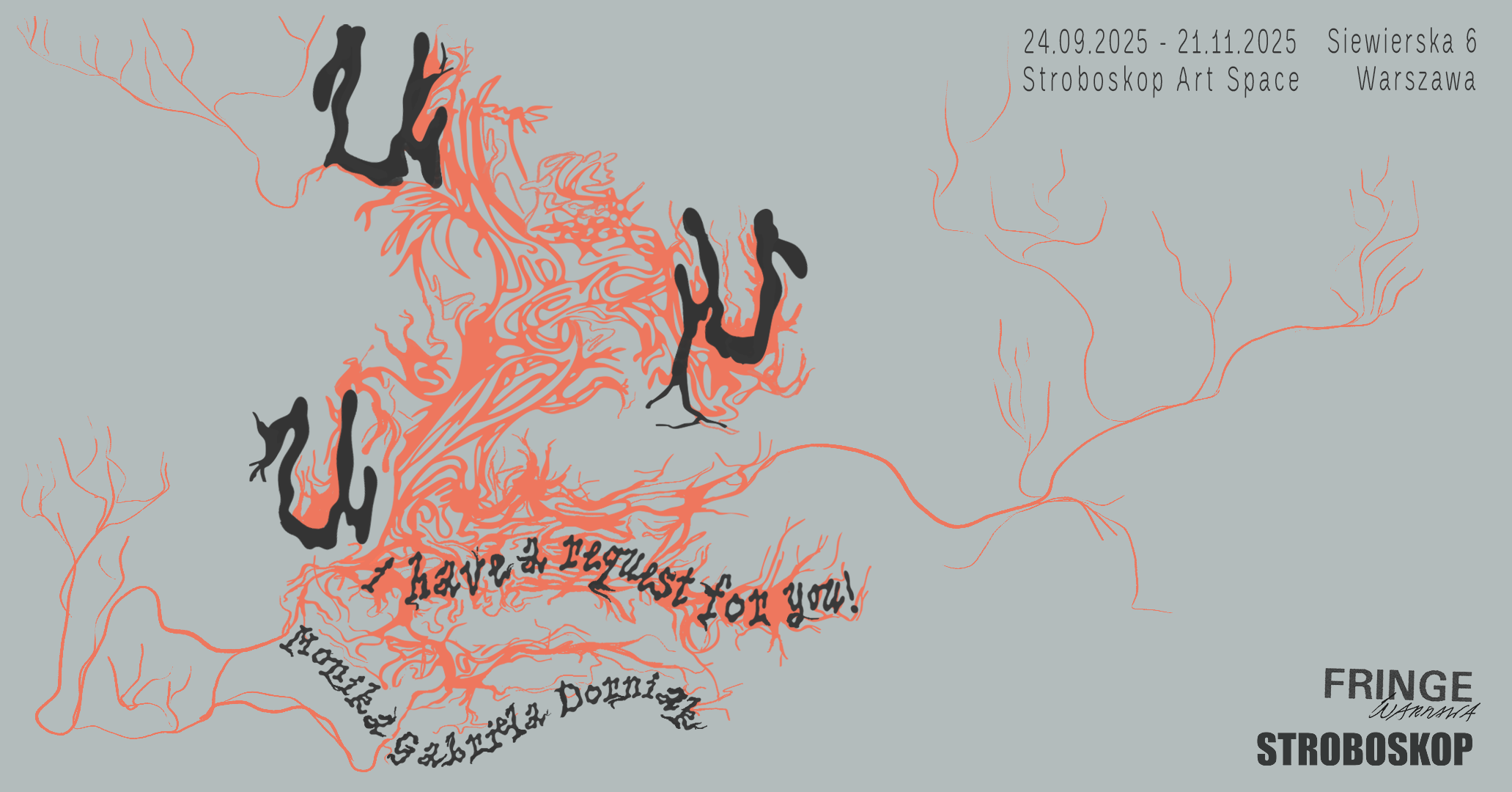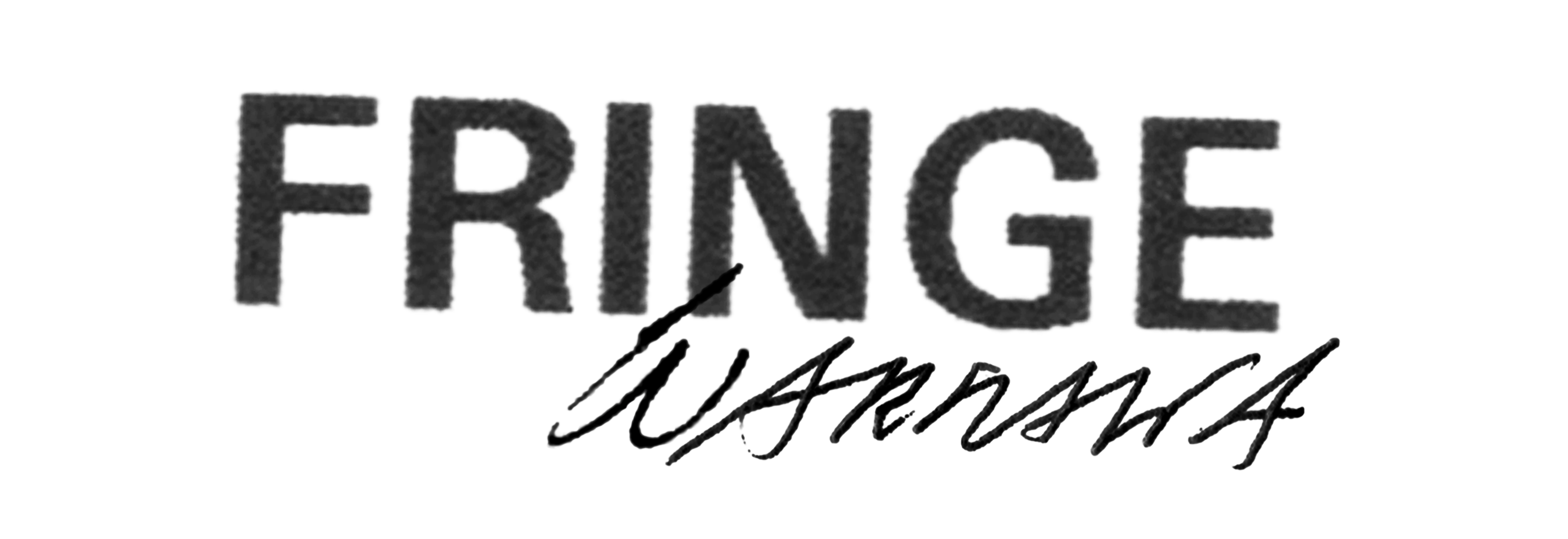Monika Gabriela Dorniak | FRINGE Warszawa 2025
u-u-u, i have a request for you! | 24.09 - 24.11.2025

visual identity by Michał Szczelina (@mihauowski)
In this site-specific installation by German-Polish artist Monika Gabriela Dorniak, the space of Stroboskop is not merely a backdrop but an active host. The constellation of works exhibited can be seen as companions living with and beside us, forming an ecology of remembrance by referring to two distinct sources: the activities of the artist’s father, who imported objects from Poland to Germany in the 1980s and 90s, and a former German WWII site— the artist’s birthplace and site of research. By poetically arranging stone, steel, wood, concrete, light, breath, and pollen in a playful dialogue, the remnants of these two different yet interconnected sites and histories enter a new conversation, reflecting the fragility, fragmentary nature, and simultaneous weight of memory. Dorniak’s research-based practice emerges from over a decade of auto-ethnographic work on intergenerational trauma, migration, and belonging, closely intertwined with her agricultural upbringing.
A tailored wool jacket leans over the edge of a mirror; a gardening book acts as protector of what might otherwise be overlooked; and steady steel drills, resembling armour, rest anxiously against the wall. These exhibited objects, transported by the artist’s father during the 1980s and 90s from Poland to the small German village where Dorniak grew up, were once practical tools for survival and adaptation—used to repair cars, build homes, and piece together a life lived liminally between worlds. Following her father’s early death, these remnants took on new meaning for Dorniak: they became fragile anchors to a life passed, markers of a Polish identity in the process of being overwritten.
Alongside these pieces, Dorniak’s own collection is embedded, including elements from her ongoing series “The Aesthetics of Knowledge” (since 2019). For her, this series is a genuine composition in correspondence with more-than-human agencies collected as part of the artist's field research—most notably stones, wood, and a mixture of fluids which engage in a crystallising process. This body of work explores humanity’s place in the Anthropocene, addressing contemporary challenges such as alienation and solastalgia, while highlighting the dynamic agency of a hybridised natural world through synthetic cycles of growth, dislocation, and relocation—particularly reflecting the profound impact of wars.
Growing up in a small German village and former WWII site, Dorniak recalls discovering bomb splinters when felling trees and unexploded grenades found while planting vegetables—events that disrupted her family’s daily agricultural activities. These acted as reminders that the past is always present, inscribed not only in bodies but also in landscapes, passed down through generations by genetics, rhizomes, and seeds. The constellations featured in “u-u-u, i have a request for you!”—fragments carried across geographies and generations, salvaged, repurposed, and remembered—together create a shifting site of memory where the human and non-human, the personal and historical, intersect. Can a stone remember war? Can a forest mourn? Does a hammer carry the rhythm of the hands that once cradled it? What does an object hold onto, and what does it release each time it is seen, moved, re-situated, touched, listened to, or honoured? Within this exhibition site, such questions resurface within the memories evoked by the objects—yours, mine, and the objects’ own.
“u-u-u, i have a request for you!” is more of a murmuring field than an exhibition —an invitation to wander, linger, and consider these companions not as monuments but as porous vessels of identity bearing the residue of touch and layers of lived experience that slip between time, utility, remembrance, presence, and absence.
W tej site-specific instalacji niemiecko-polskiej artystki Moniki Gabrieli Dorniak przestrzeń Stroboskopu nie jest jedynie tłem, lecz aktywnym gospodarzem. Konstelacja prezentowanych prac może być postrzegana jako towarzysze żyjący z nami i obok nas, tworząc ekologię pamięci poprzez odniesienia do dwóch odmiennych źródeł: działań ojca artystki, który w latach 80. i 90. importował przedmioty z Polski do Niemiec, oraz byłego niemieckiego miejsca z II wojny światowej—miejsca narodzin artystki i obszaru jej badań. Poetyckie zestawienie kamienia, stali, drewna, betonu, światła, oddechu i pyłku w swobodnym dialogu wprowadza pozostałości tych dwóch różnych, lecz powiązanych miejsc i historii w nową rozmowę, odzwierciedlając kruchość, fragmentaryczność i jednoczesną wagę pamięci. Praktyka badawcza Dorniak wyłania się z ponad dekady autoetnograficznej pracy nad traumą międzypokoleniową, migracją i przynależnością, ściśle powiązanej z jej rolniczym wychowaniem.
Szyta na miarę wełniana kurtka zwisa z krawędzi lustra; książka ogrodnicza pełni rolę ochronną dla tego, co inaczej mogłoby zostać przeoczone; stalowe wiertła, przypominające zbroję, spoczywają niespokojnie opierając się o ścianę. Te eksponowane przedmioty, przewożone przez ojca artystki z Polski do małej niemieckiej wsi, gdzie Dorniak dorastała, były kiedyś praktycznymi narzędziami do przetrwania i adaptacji—używanymi do naprawy samochodów, budowy domów i składania życia prowadzonego na pograniczu światów. Po przedwczesnej śmierci ojca pozostałości te zyskały dla Dorniak nowy sens: stały się kruchymi kotwicami przeszłego życia, znakami polskiej tożsamości w trakcie wymazywania.
Obok tych elementów osadzona jest własna kolekcja Dorniak, w tym fragmenty jej trwającego od 2019 roku cyklu „The Aesthetics of Knowledge”. Dla artystki seria ta jest prawdziwą kompozycją w korespondencji z agenturami ponad-ludzkimi, zebranymi podczas badań terenowych — przede wszystkim kamieniami, drewnem oraz mieszanką płynów uczestniczących w procesie krystalizacji. Ten zestaw prac eksploruje miejsce człowieczeństwa w antropocenie, poruszając współczesne wyzwania, takie jak alienacja i solastalgia, jednocześnie podkreślając dynamiczną sprawczość zhybrydyzowanego świata przyrody przez syntetyczne cykle wzrostu, przesiedlenia i relokacji—zwłaszcza ukazując głęboki wpływ wojen.
Dorastając w małej niemieckiej wsi i byłym miejscu działań II wojny światowej, Dorniak wspomina odkrywanie odłamków bomb przy wycince drzew oraz niewybuchów znajdowanych podczas sadzenia warzyw — wydarzenia te zakłócały codzienne rolnicze obowiązki jej rodziny. Były one przypomnieniem, że przeszłość jest ciągle obecna, zapisana nie tylko w ciałach, ale także w krajobrazach, przekazywana przez pokolenia za pomocą genetyki, kłączy i nasion. Konstelacje pokazane w „u-u-u, i have a request for you!” — fragmenty przenoszone przez geografię i pokolenia, uratowane, przetworzone i pamiętane — tworzą razem zmienne miejsce pamięci, gdzie ludzkie i nieludzkie, osobiste i historyczne, przecinają się. Czy kamień może pamiętać wojnę? Czy las potrafi żałować? Czy młotek niesie rytm rąk, które go kiedyś trzymały? Co obiekt zachowuje i co uwalnia za każdym razem, gdy jest widziany, przesuwany, zmieniany w kontekście, dotykany, słuchany lub czczony? W przestrzeni tej wystawy takie pytania powracają w pamięci wywoływanej przez obiekty — twojej, mojej i samego obiektu.
„u-u-u, i have a request for you!” to raczej szepczące pole niż wystawa—zaproszenie do wędrówki, zatrzymania się i rozważenia tych towarzyszy nie jako pomników, lecz jako porowatych naczyń tożsamości, niosących ślady dotyku i warstwy przeżytego doświadczenia, które przemijają między czasem, użytecznością, pamięcią, obecnością i nieobecnością.
“u-u-u, i have a request for you!” is a part of FRINGE Warszawa 2025, and will be open:
25.09 - 12:00 - 20:00 (vernissage 18:00 - 20:00)
26.09 - 12:00 - 18:00
27.09 - 12:00 - 18:00
28.09 - 12:00 - 18:00
The exhibition will be accompanied by an artist talk at the Goethe-Institut in Warsaw and at HfK Bremen, as well as a curated selection of books from the Potato Library at Fundacja “Ziemniaki i” @ziemniaki_i to complement the exhibition.
The titles include:
DEBRISPHERE: Landscape as an Extension of the Military Imagination (authors: Noit Banai, Andrew Chubb, Maja & Reuben Fowkes, Hito Steyerl, Raluca Voinea, Eyal Weizman)
Mediating the Otherworld in Polish Folklore: A Cognitive Linguistic Perspective (author: Ewa Masłowska)
Myth: A Symposium (edited by: Thomas. A Sebeok)
The Smell of Deposition (authors: Alejandra Salinas, Aeron German)
Approaches to Animal Communication (edited by: Thomas. A Sebeok, Alexandra Ramsay)
Compost Reader (published by: cthulhu books)
Ghosts of my Life: Writings on Depression, Hautology and Lost Futures (author: Mark Fisher)
If a Tree Falls in a Forest (edited by: Katażyna Kankovska)
Matter of Lives: Notes and Records on the Pluriverse (editors: Noemi Biasetton, Constanza Sartoris, Matteo Vianello)
Material Kinship Reader: Material beyond extraction and kinship beyond the family (contributors: Kris Dittel, Clementine Edwards)
kind ground, black butter (contributors: Lucy Hodge-Sellers, Réiltin O'Hagan, Lilou Anglerath)
Doorways to Dilema: Bewildering Tales of Dark Fantasy (edited by: Mike Ashley)
Zdrój (author: Alicja Wysocka)
Słowiańska Wiedżma: Rytuały, przepisy i zaklęcia naszych przodków (author: Dobromiła Agiles)
Sekrete Życie Drzew (edited by: Peter Wohllebn)
Three Becomes Two Becomes One Becomes None: Cosmopoiesis of Mandragoras (author: Leonie Brandner)
Tender and Toxic Tales (author: Juri Velt)
Wet Archive (author: Zakole)
This exhibition will take place within the context of the fourth edition of FRINGE Warszawa @fringe_warszawa and is curated by Katie Zazenski @kathryn.zazenski

Monika Gabriela Dorniak is a German-Polish artist and researcher with an interdisciplinary background in fine arts, choreography, psychology, and design. She often merges media—specifically performance, (textile) sculpture, and multimedia. In her practice-based research, Dorniak explores the structures of the Self through a multifaceted analysis of body, mind, and environment, considering the regressive history of nature’s domination and social power structures. Her auto-ethnographic research on intergenerational trauma, migration, and belonging is advanced through ongoing collaborations with scientists and communities as part of socially engaged commissions, including Counterpoints Arts in London (2021–2022).
Dorniak has presented her works at international institutions such as Kesselhaus at Kindl Berlin (48 Stunden Neukölln, 2024), Nationalgalerie Vilnius (2023), Drugo Mare in Rijeka (2022), Uferstudios Berlin (2021), Kommunale Galerie Bärenzwinger in Berlin (2019), Tate Exchange at Tate Modern London (2017 & 2018), Arts Catalyst in London (2016), and
Foreign Affairs Festival at Berliner Festspiele (2014). She has also been a guest lecturer at SOAS University of London (2022), Garage Museum in Moscow (2019), Al-Quds Bard College in Palestine (2018), and Chelsea College in London (2017).
Dorniak holds a Master’s Degree in Art and Science (Department of Fine Art) from Central Saint Martins in London (2017). Since 2024, she has been a Ph.D. candidate in the art- and science-based Ph.D. program between HfK Bremen and HDK Valand in Gothenburg.
Co-financed by the Minister of Culture and National Heritage from the Culture Promotion Fund – a state special-purpose fund.
The project is co-financed by the Capital City of Warsaw and the Old Town Cultural Center.
Dofinansowano ze środków finansowych Ministra Kultury i Dziedzictwa Narodowego pochodzących z Funduszu Promocji Kultury - państwowego funduszu celowego.
Projekt współfinansuje m.st. Warszawa i Staromiejski Dom Kultury
